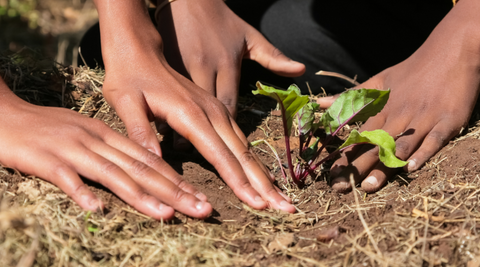The soil-gut microbiome connection
Posted by Aiden McRae on
Exploring how healthy soil invigorates our inner wellness
In our last blog, we explored the promising science behind boosting our mental and physical wellness through the simple act of gardening and spending time in the soil.
To explore another fascinating dimension, scientists believe that there is an integral relationship between the soil microbiome and our own gut microbiomes, which continues to evolve.
This means that healthy soil that is full of living microorganisms contributes directly to the composition and health of our intestinal systems.

The authors of the study “Does Soil Contribute to the Human Gut Biome?” (University of Natural Resources and Life Sciences Vienna) encourage us “to consider the human intestinal microbiome as well as the soil/root microbiome as ‘superorganisms’ which, by close contact, replenish each other with inoculants, genes and growth-sustaining molecules.” It is wondrous to think about these intimate and invisible exchanges happening on a daily basis between us and our surrounding environments.
The authors describe how this process begins:
“From early childhood, we are in contact with soil; we taste it, we inhale it, and we drink water which has passed through soil. Moreover, we ingest plants grown on soils together with soil microbiota.”
Tracing ancient patterns of diet and environment through to the present day, this study describes how our ancestors were in direct contact with the soil and animals in pre-industrial times, which inoculated us with rich gut microbiomes.
Looking to our modern lifestyles, this study shines a light on the concerning loss of soil and environmental biodiversity, including the widespread use of agro-chemicals in modern agriculture, which deplete the natural diversity of the soil microbiome.

Meanwhile, over 50% of humans live in urban areas, which limits exposure to healthy soil and beneficial bacteria found in more rural environments. Antibiotics and other modern drugs are a blessing, but also come at the cost of reduced gut bacteria. Diet has also shifted towards overly-processed foods. The richness of biodiversity in the soil and in our gut is suffering from these dramatic shifts in lifestyle.
Weaving together the critical issues of our times, this study asks us to pay close attention to the sensitive phenomena that are shaping our inner and outer worlds. Looking to our ancestors’ ways of life for clues, and investing our energy into regenerating soil are vital practices to improve overall health.
In this vein, Jeff Moyer, Chief Executive Officer at the Rodale Institute points to regenerative agriculture as a critical and overlooked component to the way we approach health care. Currently, the medical solutions put forth by the pharmaceutical industry overshadow the importance of healthy diet and lifestyle; Moyer urges us to embrace “nutrient-dense whole foods” as a key practice to reduce the risk of chronic diseases that are so prevalent.

We have all heard of the importance of healthy eating and exercise, but what if we truly integrated all of these aspects into our lifestyles, knowing that growing our own food is good for our mental, physical and spiritual health, as well as for our communities, and for the planet itself. Once we realize how interconnected our lives and actions are, they take on a greater meaning and impact.
When you take time to be with the soil, you’re feeding into an important reciprocal relationship–by caring for the soil and the local environment, the soil will care for you.
Thanks as always for reading our blog! We are passionate about soil, and sharing how it plays a deeper role in our lives than we might sometimes think.
If you are looking for products that will enhance the biodiversity in your soil, explore our offerings, including blends of living soil and our diverse manures, microbial inoculants, and biochar:
https://www.yukongrow.com/collections
References
Blum WEH, Zechmeister-Boltenstern S, Keiblinger KM. Does Soil Contribute to the Human Gut Microbiome? Microorganisms. 2019 Aug 23;7(9):287. doi: 10.3390/microorganisms7090287. https://www.ncbi.nlm.nih.gov/pmc/articles/PMC6780873/
Moyer, Jeff. “As the world reopens, a threat to our health still looms,” Heart & Soil Magazine, 2020: https://www.heartandsoilmagazine.com/HeartandSoilMagazine
All photos Canva & Unsplash
Share this post
- Tags: regenerative agriculture

